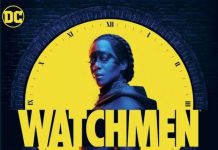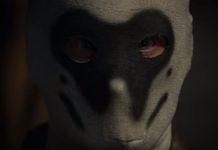I feel increasingly unqualified to review this show.
My mother, a retired English teacher, would be incredibly disappointed at my loss for words.
Each week, as I sit down to write these reviews after watching another episode I find myself either frantically typing every descriptive word in the dictionary (at least those I know) trying to articulate how I feel, or, as is the case with “The Extraordinary Being”, being at an almost total loss for words.
That’s just how good this show is.
I don’t know what else to say. This show is the best live-action superhero show that has ever existed. Hell, it’s one of my favorite shows that HBO has ever done (at least after only 6 episodes), and with their history, that’s saying something.
“The Extraordinary Being” focuses on the origin and life of Hooded Justice, with the episode opening with the serialized depiction of the Minutemen in the show’s universe.
This was the first episode that focuses exclusively on one storyline. No Ozymandias (which speaks to how amazing this episode was, that it could be this incredible without even a glimpse of Irons’ Veidt), and for the most part, the other storylines have converged into where we left Angela — who swallowed an entire bottle of her grandfather’s memories in the form of the designer drug “Nostalgia”; created by none other than the mysterious Lady Trieu.
Here we see that history (in the form of an over-the-top TV show that would probably air on A&E) remembers Hooded Justice as a white man hell-bent on taking down the racist police and KKK, as he gruffly and angrily dispatches of two corrupt police detectives. In the original graphic novel, the true identity of Hooded Justice was never known. All anyone knew was that he was the original superhero that inspired the Minutemen, they thought he was a white man, and that he was the hero who stopped The Comedian from raping Sally Jupiter.
Of course, as you might have guessed if you’ve been paying attention, Hooded Justice was really Will Reeves, Angela’s wheelchair-bound grandfather, who donned the mask after becoming a policeman in the 1950’s and suffering a great injustice at the hands of his fellow officers who were part of a secret, KKK-driven organization that incited racism and violence amongst Brooklyn’s African American citizens.
This episode follows Will’s transition from cop to vigilante, his feeling of helplessness and anger at the limits of the so-called justice system, the violent incident that made him don a mask to strike fear into the hearts of racists, and the effect that his double life had on his personal life after his alter ego became his obsession.
If this sounds familiar, and considering that I’m writing this review for Batman On Film, you may understand why this was my favorite episode to date. Even with the similarities to The Dark Knight, this episode was anything but a retread or unoriginal. You truly felt empathy for Will, and you rooted for him to take it to the Klan. You grieved for Will having to paint his eyes white so that people would think it was a white man crusading for African Americans instead of one of their own.
As the legend of Hooded Justice grows, he is sought out by Captain Metropolis who tells Will that he has inspired a group of heroes to form the Minutemen. After Will agrees to join them if they agree to help him take down the “Cyclops”. However, even after a romantic fling with Captain Metropolis (the show also touches on the two being in love; something the graphic novel also hinted at), a distraught Will finds that The Minutemen were seemingly just a publicity stunt, and that Captain Metropolis and the other members want no part in helping him take down the Cyclops.
After deducing their plot, Will goes in alone and single-handedly takes them down. The primary antagonist is a white police officer who works with Will who is secretly the Cyclops’ leader. We find out that this was the man in the photo in Chief Judd Crawford’s closet, and that it turned out that he was his grandfather. (I totally missed this, and thought the photo was Crawford with the boy who bullied Angela’s daughter early on in the season)
Will’s wife June, who turns out to be the baby Will rescued as a child, initially supported his crusade. But, as Will’s anger grows and boils over when he finds his son (presumably Angela’s father) donning his Hooded Justice costume, she leaves him in Brooklyn to return to Tulsa with their son. This explains why Angela never knew Will, as it seems apparent that Will and June never reconciled after she left.
I’ve spent so much time analyzing the plot that I think it’s time to pay my respects to the cinematography and use of music.
The rock n roll bassist in me loves Trent Reznor and Atticus Ross, and their amazing score just adds to their already legendary resumes. Lindeloff brilliantly uses music sparingly in the episodes which results in the score having a maximum impact when it’s utilized.
The cinematography in this episode is reminiscent of Sin City, old noir films, but with a twist of modern brilliance. I’m a big fan of psychedelia, and I have to say, the depiction of Angela’s mental state as she overdosed on Nostalgia and had (to say the least) a “bad trip” was spot on and gave me heart palpitations in several spots. She took herself to the edge to find out Will’s secrets, only to be saved at the end of the episode by Lady Trieu. We have no idea what her endgame is, or whether her (or Will now for that matter) are friend or foe.
The show ends with Will’s perspective on why and how he ended Chief Crawford. Suffice it to say that you just need to watch that for yourself. If you’re reading this and you haven’t watched Watchmen, well, tick-tock. – Mance Fine










